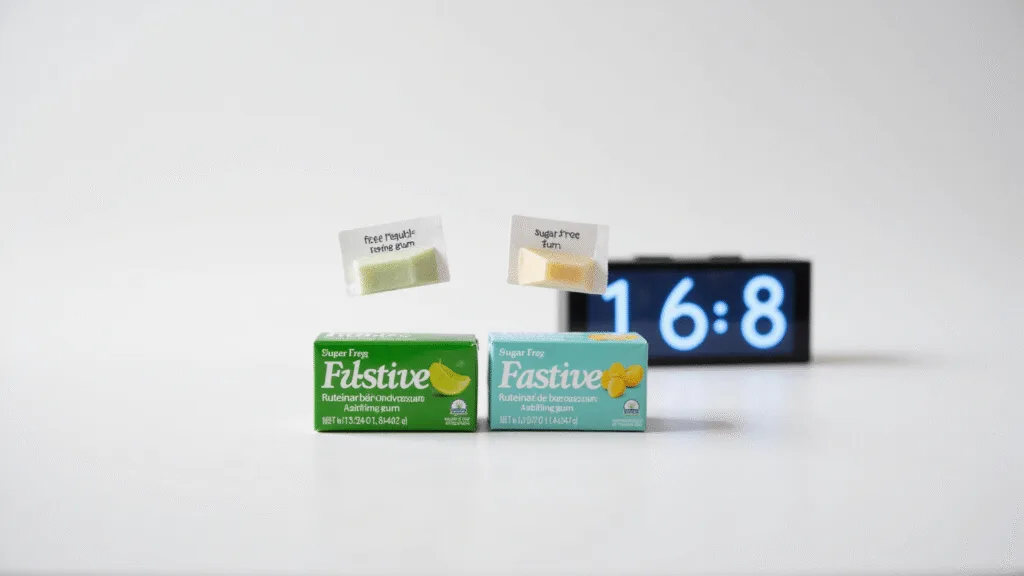Does Chewing Gum Break a Fast? The Truth About Gum During Intermittent Fasting
I’ve been practicing intermittent fasting for years now, and one question keeps popping up from both my clients and fellow fasters: does that stick of gum you reach for during fasting hours actually break your fast?
Let’s cut through the confusion once and for all. The answer isn’t as straightforward as you might hope, but I’ll break it down in practical terms that actually matter for your fasting goals.

The Short Answer: It Depends on Your Fasting Goals
The truth is, whether gum breaks your fast depends entirely on what you’re fasting for:
- For weight loss: Generally, sugar-free gum won’t significantly impact your results
- For autophagy and cellular health: Any gum might potentially interrupt the process
- For gut rest: Chewing anything, including gum, activates digestive processes
- For spiritual or religious reasons: Many traditions consider gum a fast-breaker
I’ve tested different approaches with myself and observed hundreds of clients, and here’s what I’ve learned about that innocent-looking piece of gum in your pocket.
What Actually Happens When You Chew Gum While Fasting
When you pop that piece of gum, several things happen physiologically:
Insulin Response:
Your body might produce a small insulin response, even to sugar-free gum. This happens because:
- Your brain registers the sweet taste
- Your mouth begins producing digestive enzymes
- Your body prepares for incoming calories (even if they’re not coming)
Caloric Impact:
Different types of gum contain different ingredients:
- Regular gum contains 5-10 calories per piece (primarily from sugar)
- Sugar-free gum typically contains 2-5 calories per piece (from sugar alcohols and base ingredients)
Digestive Stimulation:
The physical act of chewing:
- Activates saliva production
- Triggers stomach acid release
- Primes your digestive system to receive food
The Different Types of Gum and Their Impact on Fasting
Not all gum is created equal when it comes to fasting. Let’s look at the spectrum:
Sugar-Based Gum:
- Contains 5-10 calories per piece
- Triggers significant insulin response
- Verdict: Definitely breaks a fast
Sugar-Free Gum with Artificial Sweeteners:
- Contains 2-5 calories per piece
- May trigger a smaller insulin response
- Contains aspartame, sucralose, or acesulfame potassium
- Verdict: Technically breaks a strict fast, but minimal impact
Sugar-Free Gum with Sugar Alcohols:
- Contains xylitol, sorbitol, or erythritol
- Similar caloric impact to artificial sweeteners
- May cause digestive discomfort for some people
- Verdict: Technically breaks a strict fast, but minimal impact
Natural Gum (Like Chicle):
- Made from tree sap
- Often still contains sweeteners
- Verdict: Still breaks a strict fast, despite being “natural”
Why Many Experts Still Allow Gum During Fasting
Despite the technical violations, many fasting experts (including some I’ve studied under) still permit sugar-free gum during fasting windows. Here’s why:
1. Practicality and Sustainability
- For many people, gum helps manage hunger
- It can reduce the temptation to break a fast early
- Better to chew gum than abandon fasting altogether
2. Minimal Metabolic Impact
- The caloric load is extremely small
- Any insulin response is typically minor and brief
- Most people will remain in a fat-burning state
3. The 80/20 Rule of Wellness
- Perfect adherence isn’t necessary for results
- The stress of perfect compliance can be counterproductive
- A sustainable approach yields better long-term outcomes
The Best Types of Gum If You Choose to Chew During Fasting
If you decide gum is worth it during your fasting window, here are my recommendations:
Best Options:
- Sugar-free gum with xylitol (bonus: good for dental health)
- Gum with minimal ingredients
- Unflavored chewing gum (harder to find but exists)
Look for These on Labels:
- No artificial colors
- No hidden sugars (watch for maltodextrin, dextrose)
- Lower calorie count per piece
Limit Yourself To:
- 1-2 pieces during fasting windows
- Chewing for shorter periods rather than all day
When You Should Absolutely Avoid Gum While Fasting
There are some situations where even sugar-free gum is a definite no-go:
Religious Fasting:
- Most religious fasting traditions consider gum a violation
- Consult specific religious guidelines for your practice
Medical Fasting:
- If fasting for medical tests or procedures, follow medical advice
- Even sugar-free gum can interfere with some test results
Extended Therapeutic Fasting:
- When fasting for autophagy or cellular regeneration
- When working with medical supervision for specific health conditions
- When trying to give your digestive system complete rest






